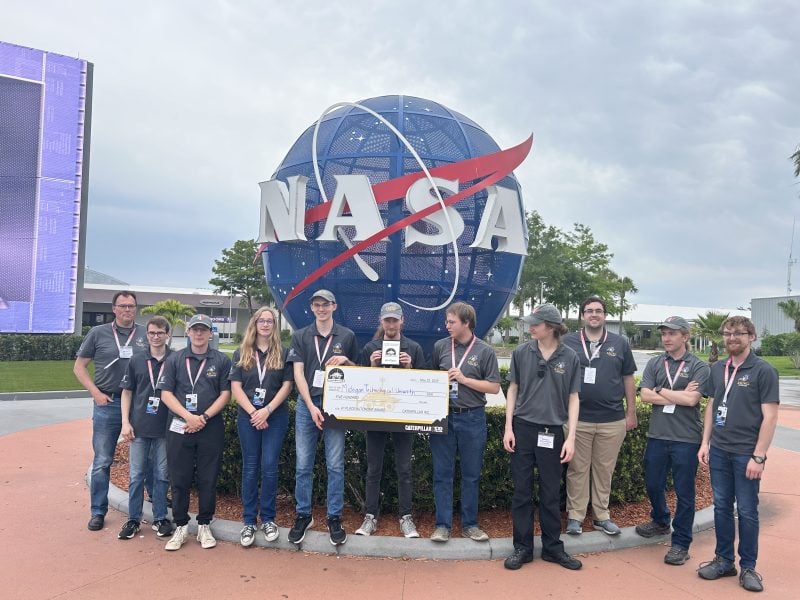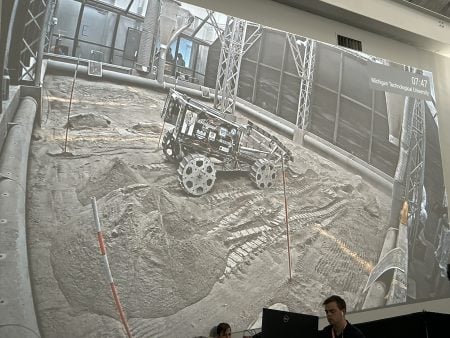
Michigan Tech students have a long history of shooting for the moon—and some Huskies get very close. This May, Multiplanetary INovation Enterprise’s (MINE) Astro-Huskies team placed fourth in the 16th annual NASA Lunabotics Challenge. Developed to highlight NASA’s systems engineering principles, the annual challenge tasks student organizations from universities around the country to design, build, and test a prototype off-world construction robot.
Student groups spend a full academic year working on their prototype while meeting technical milestones and submitting materials to NASA ahead of the qualifying rounds at the University of Central Florida. The top ten teams from qualifying rounds go on to compete in the finals at the NASA Kennedy Space Center Visitor Complex.
“Competing in Florida was an eye-opening experience,” said Lunabotics team member and mechanical engineering senior Katherine Rauscher. “We learned a lot as we met teams from all over the country and talked to other students about how they approached the design process.”
Part of Tech’s Enterprise Program, MINE consists of multiple student-run teams that develop robotic technologies for extreme environments. The Lunabotics Astro-Huskies team was founded in 2019 and competed in their first national challenge in 2022. As part of this year’s challenge, the Astro-Huskies constructed a working lunar rover prototype equipped with excavation capabilities and autonomous elements.
Meet Atlas
The Advanced Terrain Lunar Alteration and Shaping rover, or ATLAS, was nothing more than a book of guidelines when the Astro-Huskies got to work last August. This year’s competition specifications included a requirement that the rover remotely maneuver across a simulated lunar surface to an excavation site, collect material, move along to a construction site, and deposit the material. The volume of deposited material helped to determine the team’s score along with additional points for the success of autonomous operation. While autonomy was not required, it was encouraged by the stratified point system. This year, Tech’s ATLAS rover autonomously collected and deposited material.

In order to make it to the qualifying rounds in Florida, the Michigan Tech team needed to both develop their working rover prototype and submit technical papers and videos throughout the year that highlighted their use of the systems engineering process and local STEM outreach. They were also required to document construction progress.
For some, the level of work and attention to detail would be daunting. For Rauscher and her fellow Lunabotics team members, it was thrilling.
“One of my favorite things about our interdisciplinary Lunabotics team is that we progress from rough whiteboard sketches all the way to a fully functional rover in just two semesters,” said Rauscher. “I especially enjoy the manufacturing phase since there’s so much hands-on work and problem solving to get everything to integrate as intended.”
A Credit to Husky Organization and Ingenuity
Faculty advisor Paul van Susante, associate professor and Lou and Herbert Wacker Professor of Mechanical Engineering, has been involved with the NASA Lunabotics Challenge since its inception. The program is now in its 16th year. However, the mentor attributes the Astro-Huskies’ success to their own motivation.
“Even with an experienced faculty advisor, if the team doesn’t organize themselves, then it doesn’t matter,” said van Susante. “The fact is we have great students who are motivated to do well. They pretty much run themselves.”
The Astro-Huskies also receive the support they need to succeed by being a part of Tech’s Enterprise Program.
“Enterprise in general is a very unique experience and Lunabotics is a particularly welcoming group where members can make major contributions to design and leadership in their first year,” said Rauscher.
Having students involved for multiple years allows their experience level to grow over time. Where other university teams may compete within a senior capstone course or extracurricular club, MINE’s team has dedicated spaces, time, and resources that they’ve been building on since 2019.
“If we ran this through a senior design course, then each year, everyone who participated in the challenge would graduate, and we would have none of that knowledge going forward,” said van Susante.
Keeping that knowledge moving forward is an intentional part of the team’s process. The Astro-Huskies brought 10 students to Florida this year; five seniors or graduating students and five students that make up next year’s team leadership. Among the latter, Rauscher will be next year’s Lunabotics Project Manager. already looking ahead.
“I’m very proud of our team’s strong results at finals this year,” said Rauscher. “With next year’s leadership, returning talent, and new members, I’m even more excited to see what we can achieve at the competition in 2026!
About the College of Engineering
Michigan Tech’s College of Engineering offers more than 15 bachelor of science degrees in biomedical engineering, chemical engineering, civil, environmental and geospatial engineering, electrical and computer engineering, engineering fundamentals, geological and mining engineering and sciences, manufacturing and mechanical engineering and technology, materials science and engineering, and mechanical and aerospace engineering.
Our engineering graduate degree options include master’s and PhD programs, along with robust online certificate programs for busy professionals. Follow Michigan Tech Engineering on Facebook, Instagram, LinkedIn, and Twitter for the latest happenings.